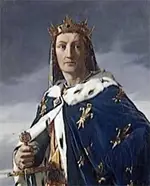The French King Louis VIII
Louis VIII was King of France in the early 13th Century. He gained fame as the heir apparent and pretender King of England. He was born on Sept. 5, 1187, in Paris. His father was the reigning monarch, King Philip II. He was married in 1200, at age 12, to Blanche of Castile, whose mother was Eleanor of England, sister of England's King Richard I and King John. Louis and Blanche would eventually have 13 children together. Louis was supposed to marry Eleanor of Brittany, the niece of England's King Richard I, but objections by the Holy Roman Emperor, Henry VI, scuttled the arrangement. 
John and Philip were at odds, mainly because John kept invading to reclaim territory that Philip and his predecessors had taken at the expense of the once large Angevin Empire. John made yet another push in 1214, facing off against a force led by Prince Louis and then fighting alongside a handful of allies against Philip and a large force in the Battle of Bouvines. The decisive French victory convinced John to return to England. The very next year, a number of wealthy and powerful barons in England rebelled against their king. Fighting followed, in what is often termed the First Barons' War. During this conflict, the rebellious barons offered the English throne to Louis. The prince and French king-in-waiting took the barons up on their offer and led an invasion into England in May 1216 that resulted in his seizure of London and his being proclaimed king by a large crowd. Supporting Louis and the barons was a Scottish force led by King Alexander II, who had marched the length of England to support Louis (who came to be known as Louis the Lion) and the barons. The next month, Louis took Winchester, resulting in his controlling more than half of John's land. John, in one last attempt to reclaim French territory, led Returning to England after another defeat, John lost most of his prized possessions, including the Crown Jewels, in a freak storm. He was succeeded by his oldest son, who became King Henry III. At a stroke, the prosecution of the war in England changed. The barons who were so up in arms at John's treatment of them had no hatred for Henry; rather, they pledged the loyalty to the new king and abandoned their support for France's Prince Louis to be their new ruler. A resurgent English force defeated Louis and his soldiers at Lincoln and Dover and then the French Navy, all in 2017. Louis sued for peace and abandoned any pretensions to the English throne, as part of the Treaty of Lambeth; for his trouble, Louis collected 10,000 marks from John's government. Philip II died on July 14, 1223, and Louis became King Louis VIII. He made waves by prohibiting his Christian subjects from lending to his Jewish subjects. Louis also joined the crusade to eliminate the Cathars and seized Avignon and the Languedoc. He died during this campaign, of dysentery, on Nov. 8, 1226. Succeeding Louis was his oldest surviving son, who became Louis IX. He also became the first in the Capetian line to hand over estates and government positions to his younger sons. |
|
Social Studies for Kids
copyright 2002–2024
David White




